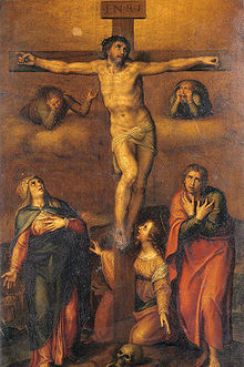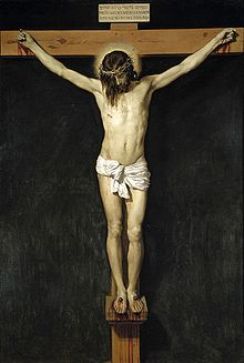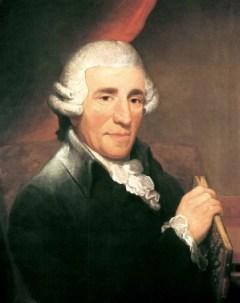Joseph Haydn - Seven Last Words of Christ
Joseph Haydn - Seven Last Words of Christ
1. "Father forgive them, for they know not what they do!".
2. "Truly, I say to you, today you will be with me in paradise".
3. "Woman, behold your son: behold your mother".
4. "My God, My God, why have you forsaken me?".
5. "I thirst".
6. "It is finished!".
7. "Father, into your hands I commit my spirit".
Seven times did Christ speak to his Father and people. All these sayings, although scattered in four canonical gospels, complete one another in the context of God's plan of salvation, creating a moving testimonial of forgiveness, salvation, heartache, loneliness, suffering, victory and faith in prayer.

Michelangelo - Crucifixion
"Oratorio without text" related to the last words of Christ - Haydn received such an unusual request from the superior of the confraternity Hermandad de la Santa Cueva in Cadiz. He fulfilled the task exquisitely, creating one of his most popular compositions.
Joseph Haydn - Seven Last Words of Christ
The work consists of seven instrumental sonatas (seven times adagio) preceded by an introduction and crowned by one quick-paced fragment - Il Terremonto - picturing an earthquake and the resurection. Each of the sonatas announce a fragment of Gospel - the words of Christ spoken before his death.
The composition was first played in Cadiz on Good Friday 1787 and was greeted with such acclaim that three other versions were later created - a vocal one, a quartet one and another one for piano.

Diego Velazquez - Crucifixion
Haydn himself recalled the event some years later: "The walls, windows, and pillars of the church were hung with black cloth, and only one large lamp hanging from the center of the roof broke the solemn darkness. At midday, the doors were closed and the ceremony began. After a short service the bishop ascended the pulpit, pronounced the first of the seven words (or sentences) and delivered a discourse thereon. This ended, he left the pulpit and fell to his knees before the altar. The interval was filled by music. The bishop then in like manner pronounced the second word, then the third, and so on, the orchestra following on the conclusion of each discourse.
My composition was subject to these conditions, and it was no easy task to compose seven adagios lasting ten minutes each, and to succeed one another without fatiguing the listeners; indeed, I found it quite impossible to confine myself to the appointed limits".
Haydn wrote Seven Last Words in 1786 for full classical orchestra. The following year he presented a different version for string quartet, which later became the most popular one. At the same time Haydn's publisher had a piano version prepared.
In 1975 Haydn travelled around Germany and Austria. In Passau he heard an arrangement with chorus created by Kapellmeister Joseph Friebert, who had added a few chorals to the original. It wasn't until then that Haydn created his own version including chorus, which he then thought of as the most important oratorio. He used the lyrics written by Baron Gottfried van Swieten. This final version was first performed in Vienna in 1796 and published in 1801.
"The Seven Last Words of Our Saviour on the Cross" is one of the most spiritual and subtle compositions of Haydn. It was musical proclamation of great piety.
It's really beautiful music, full of expression and grace.

Joseph Haydn, portrait from 1792 by Hardy
Last Updated (Wednesday, 18 March 2015 16:19)








